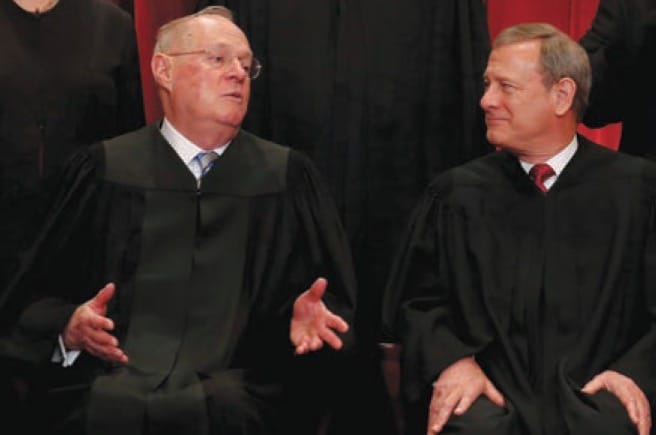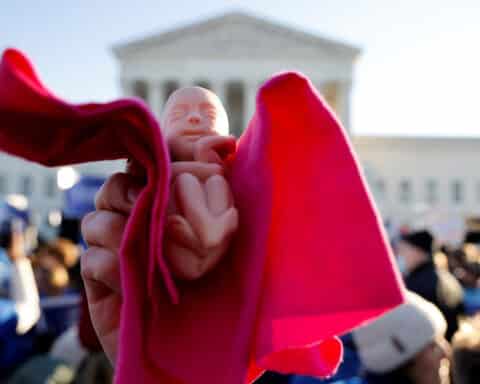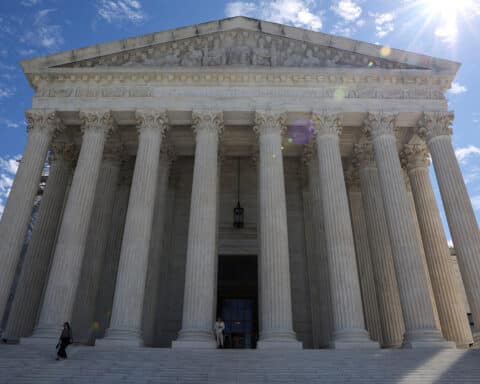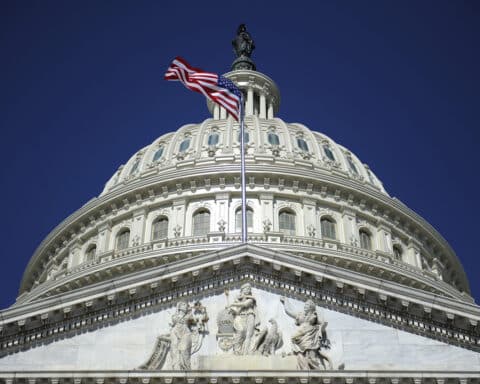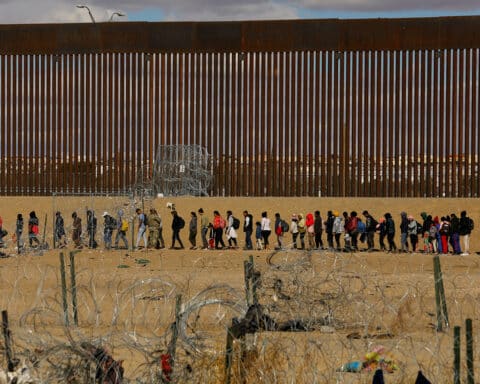Justice Anthony Kennedy’s upcoming retirement from the U.S. Supreme Court has risen hopes in Catholic and pro-life circles that the high court will not only be more amenable to religious freedom and conscience rights, but may even revisit its precedents on abortion.
“We’re expecting the next Supreme Court justice to be someone who recognizes that when you have these very divisive constitutional issues, that reargument can be warranted,” said Catherine Glenn Foster, the president and CEO of Americans United for Life.
Foster told Our Sunday Visitor that pro-life activists and legal observers have long expected that the Supreme Court one day would revisit its landmark 1973 decision in Roe v. Wade that declared abortion to be a constitutional right.
“Now we simply expect that to come even a little bit sooner than we might have thought,” Foster said.
Hope for a pro-life justice
President Donald Trump has promised to replace Kennedy — a swing vote in many of the court’s 5-4 decisions — with a pro-life conservative justice from his short list of 25 candidates who have been vetted by leaders from the conservative Federalist Society and Heritage Foundation.
Pro-life leaders and independent legal analysts agree that replacing Kennedy, whose retirement becomes effective on July 31, with a more conservative justice could “move the ball down the field” toward overturning Roe v. Wade. But whether the court will actually strike down its landmark case is another matter.
“There is no guarantee they would agree to overturn a precedent like that,” said Robert Destro, a law professor and director of the Institute for Policy Research and Catholic Studies at The Catholic University of America.
Destro told OSV that he believes some pro-life activists “are getting way ahead of themselves” in their optimism about the demise of Roe v. Wade. He noted that even if the court overturns the ruling — a longshot in his opinion — abortion would still remain legal in many states.
“Have you done the due diligence? Have you built the political coalitions you’re going to need to basically create pro-life majorities in the states? Because overturning Roe v. Wade simply means that this goes back to the states,” Destro said.
Richard Garnett, a law professor and director of the Program on Church, State & Society at the University of Notre Dame, told OSV that it will be interesting to see what the Supreme Court will do if presented with a case that challenges the court’s precedent that states cannot impose a substantial burden on women seeking abortion, especially when the unborn child is not viable outside the womb.
Revisiting ‘Roe’
That standard was set in the court’s 1992 decision in Planned Parenthood v. Casey, which also affirmed Roe v. Wade‘s central holding that abortion is a constitutional right. The federal courts frequently use the Casey standard to analyze legal challenges to various state-level abortion regulations. Kennedy helped to write the Casey decision.
“The real question is if a case comes up that imposes a substantial regulation on the abortion right, and it’s substantial enough that the Casey decision wouldn’t allow it, would Kennedy’s replacement vote to change the Casey standard, or even overrule it? That, I think, remains to be seen,” Garnett said.
Andrew Bath, the executive vice president and general counsel of the Thomas More Society, told OSV that “it’s certainly possible” that the court will revisit Roe v. Wade, which he called “a terrible decision that should be overturned.”
Bath noted that the court has recently shown a willingness to overturn prior rulings. On June 27, the Supreme Court ruled 5-4 in Janus v. American Federation of State, County and Municipal Employees, Council 31, deciding that requiring public sector workers to finance union activity violated their First Amendment rights.
The Janus decision overturned the court’s 1977 ruling in Abood v. Detroit Board of Education that had previously allowed public sector unions to collect fees from nonunion members for collective bargaining.
“So, it could be that a future court could overturn Roe and overturn Casey,” Bath said.
And having a constitutionalist jurist joining a five-member conservative majority could result in the court being more sympathetic to pro-life issues.
“I would think so because the right to life is the most fundamental right of all, and it was recognized in our founding documents,” Foster said, though adding that she would expect the court’s deliberations “not to be political” in such cases.
“It’s about the Constitution. It’s not about someone who’s coming in to the court, saying, ‘I can’t wait to overturn Roe,'” Foster said. “This is about adherence to the Constitution. But with that said, it seems pretty clear that our nation’s founding documents do not in fact include a right to abortion but do include a right to life.”
Change culture not court
Ashley McGuire, senior fellow with The Catholic Association, told OSV that the selection of a new Supreme Court justice is important for Catholics and non-Catholics alike who value the rule of law.
“I think there’s a sense that ideology has taken over the courts,” McGuire said. “Catholics care about a variety of issues, but a disproportionate number of issues that we really care about are decided by the Supreme Court, such as religious liberty and the right to life.” McGuire said the possibility of the president choosing a justice in the mold of Neil Gorsuch, a conservative jurist whom Trump appointed to the high court last year, “will mean good news for the issues that Catholics care about.”
In cases where religious freedom concerns and conscience rights clash with public accommodation and anti-discrimination laws, having a conservative and originalist majority on the court could also work to benefit religious liberty advocates.
“Free exercise [of religion] protection is likely to be stronger,” said Douglas Laycock, a professor at the University of Virginia School of Law who studies and writes on religious liberty cases. Laycock told OSV that the conservative majority could even “find a right to refuse to assist with same-sex marriages without a record of hostile statements or discriminatory enforcement.”
On its blog, the National Organization for Marriage on June 27 commented on the possibility of overturning the Supreme Court’s 2015 decision in Obergefell v. Hodges, which declared that same-sex couples have a constitutional right to marry. Kennedy wrote the majority opinion in that case.
Garnett said he would “be very surprised” if the court were to overrule Obergefell. “I suspect even if the new justice thinks Obergefell was wrong, he or she, or Chief Justice Roberts wouldn’t want to overrule it,” Garnett said. “The argument being, once you had Obergefell and thousands of people relying on that, it would be pretty dramatic to undo it.”
Even if the Supreme Court overturns Roe and scraps its Casey precedents, Garnett and other analysts added that abortion will remain a reality in many states, so it will be important for Catholics and pro-life activists to continue working to change the culture.
“The Supreme Court is not going to save us on this issue,” Garnett said. “Perhaps it will get out of the way a little bit.”

